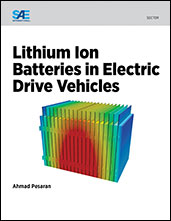Technical Paper
Thermal Evaluation of Toyota Prius Battery Pack
2002-06-03
2002-01-1962
As part of a U.S. Department of Energy supported study, the National Renewable Energy Laboratory has benchmarked a Toyota Prius hybrid electric vehicle from three aspects: system analysis, auxiliary loads, and battery pack thermal performance. This paper focuses on the testing of the battery back out of the vehicle. More recent in-vehicle dynamometer tests have confirmed these out-of-vehicle tests. Our purpose was to understand how the batteries were packaged and performed from a thermal perspective. The Prius NiMH battery pack was tested at various temperatures (0°C, 25°C, and 40°C) and under driving cycles (HWFET, FTP, and US06). The airflow through the pack was also analyzed. Overall, we found that the U.S. Prius battery pack thermal management system incorporates interesting features and performs well under tested conditions.

